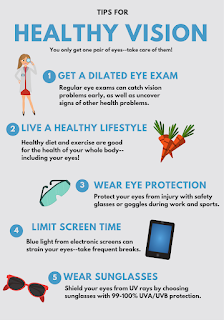Presentation
Summer is a time of glossy daylight and outside exercise. Be that as it may, the raised exposure to bright (UV) beams presents significant dangers to eye well-being, explicitly for those previously encountering eye conditions. Shielding your eyes from the sun is significant in forestalling visual impairment and other related eye inconveniences. Here, we give exhaustive sun-powered assurance clues to guarantee your eyes keep on being energized and protected all through the mid-year season months.
 |
| Visual deficiency avoidance: 6 sun protection advice for eyes in summers for eye patients |
Protecting our eyes from harmful ultraviolet (UV) rays is critical throughout the summer months to avoid visual insufficiency and preserve general eye health. Long-term UV exposure can cause serious eye disorders such as cataracts, macular degeneration, and photo-keratitis. Just as sunscreen protects our skin, our eyes require proper protection from the sun's harmful effects.
This page contains important suggestions for protecting your eyes during the summer, such as wearing UV-blocking sunglasses, wide-brimmed hats, and seeking cover during peak sunshine hours. By employing these sun protection measures, we can enjoy the sunny season while keeping our vision safe and healthy.
Grasping UV Radiation and Its Consequences for Eyes
UV radiation from the sun is an excellent thought process for different eye inconveniences. Drawn out exposure can cause conditions including waterfalls, macular degeneration, or even eye malignant growths. UV beams can hurt the cornea, focal point, and different pieces of the consideration, fundamental to long-term period inventive and farsighted disability.
 |
| UV rays' impact on the skin, eyes, & immune system |
Understanding those dangers highlights the significance of adequate eye security. The sun emits ultraviolet (UV) light that is invisible but extremely harmful to the eyes. UV radiation is divided into three categories: UVA, UVB, and UVC. While UVC is mostly absorbed by the Earth's atmosphere, UVA and UVB can enter and injure the eyes. Prolonged exposure to these rays can induce cataracts, macular degeneration, and photo-keratitis (eye sunburn).
 |
| Educate yourself about the dangers of UV radiation to your eyes and overall health |
These disorders can cause vision impairment and, in severe circumstances, blindness. Understanding the detrimental consequences of UV radiation emphasizes the significance of protecting our eyes, especially during the summer when UV exposure is highest. Implementing appropriate sun protection techniques is critical for ensuring long-term vision health.
Top Sun Assurance Tips for Eyes
 |
| Weather conditions might cause more tears to evaporate, resulting in dry eyes & anxiety. |
Wear Shades with UV Assurance
Use Caps with Overflows
Look for Shade During Pinnacle Sun Hours
Be Aware of Intelligent Surfaces
Consider UV-Impeding Contact Focal points
Utilise Defensive Eye-wear
Wear Shades with UV Assurance
Put resources into fantastic shades that block a hundred% of UVA and UVB beams. Search for marks that show full UV well-being. Wraparound styles are explicitly powerful as they save you beams from entering the edges. UV-protective eye-wear is vital for protecting your eyes from dangerous ultraviolet (UV) radiation.
 |
| These UV rays have the highest energy and may be the most damaging to your skin & eyes. |
Look for sunglasses that block all UVA and UVB rays, as they offer the best protection against sun-induced eye damage. Sunglasses with UV protection can help prevent cataracts, macular degeneration, and photo-keratitis. When choosing sunglasses, look for wraparound versions or ones with wider lenses to offer comprehensive coverage, protecting not only your eyes but also the delicate skin surrounding them.
 |
| The sun's rays provide life for our world, yet they can be blinding to your eyes |
Polarised glasses help reduce glare, increasing visual comfort and safety, particularly during outdoor activities. Wearing UV-protective sunglasses on a regular basis can dramatically minimize the risk of long-term eye damage and keep your eyesight healthy.
2. Use Caps with Over-flows
A broad overflowing cap can strikingly lessen the amount of UV radiation over your eyes with the guide of as much as half. Matching a cap with sun offers additional well-being and is predominantly helpful all through level sun hours. Using brimmed caps is an efficient approach to shield your eyes from damaging UV rays during the summer.
 |
| It's very bright; I should (put on / wear) my sunglasses |
Wide-brimmed hats or caps can filter direct sunlight and lower the amount of UV radiation that reaches your face and eyes. A brim of at least 3 inches provides substantial shade, lowering the risk of eye disorders like cataracts and photo-keratitis. Hats supplement UV-blocking eye-wear, particularly during high sunlight hours.
 |
| Tap the side of the frame to change the lens colour quickly |
They also assist to prevent sunburn on your face and neck, increasing your overall sun protection. Include wide-brimmed hats in your outdoor attire to ensure a holistic approach to eye and skin protection, preserving both your eye health and overall well-being.
3. Look for Shade During Pinnacle Sun Hours
Between 10 a.m. and noon, the sun's rays are most visible. During those hours, attempt to remain in concealed regions as long as possible. If you have any desire to be outside, guarantee you have satisfactory eye assurance.
 |
| Tap the side of the frame to change the lens colour quickly |
Seeking cover during peak sunshine hours, usually between 10 a.m. and 4 p.m., is an important technique for protecting your eyes from dangerous UV radiation. The sun's rays are at their highest during these hours, increasing the danger of UV exposure and eye damage. Finding shade under trees, umbrellas, or canopies can help avoid cataracts and macular degeneration.
 |
| It's very bright; I should (put on / wear) my sunglasses. |
Combining shade with other protective measures, such as UV-blocking sunglasses and wide-brimmed hats, provides total protection. This method not only protects your eyes, but also your skin from sunburn and lowers the total risk of long-term solar damage. By prioritising shade during peak hours, you can enjoy outdoor activities while reducing the risk to your eye health.
4. Be Aware of Intelligent Surfaces
Surfaces like water, sand, and asphalt can imitate UV beams and blast openness. At the point when you get around these areas, play it safe via conveying shades and caps to shield your eyes from reflected beams.
 |
| Slowly move the glasses from side to side, then up and down while staring through the lenses. |
Awareness of intelligent surfaces is critical for protecting your eyes from indirect UV radiation. Water, sand, concrete, and snow are examples of intelligent surfaces with reflecting qualities that can amplify UV exposure and raise the risk of eye injury. When exposed to sunshine, these surfaces reflect UV rays upward, which can cause photo-keratitis (eye burning) or snow blindness. To reduce this danger, wear UV-protective eye-wear and seek shade when near intelligent surfaces, especially during high sunlight hours.
 |
| Slowly move the glasses from side to side, then up and down while staring through the lenses |
Additionally, wraparound sunglasses might give added protection by minimizing exposure to reflected UV radiation from the sides. You can reduce the risk of UV-related eye damage and maintain optimal eye health by remaining aware of intelligent surfaces and taking proactive precautions to protect your eyes.
5. Consider UV-Impeding Contact Focal points
Assuming you put on touch focal points, check if they offer UV well-being. Many present day contact focal points incorporate inherent UV blockers, bestowing an additional layer of protection on hazardous beams. Be that as it may, they never have to supplant, never have to, anyway, rather than be utilized along with them.
 |
| Polarized lenses help to block polarized light. |
When choosing UV-impeding contact lenses, it is critical to prioritize eye health and sun protection. UV-impeding contact lenses add an extra layer of protection against dangerous UV radiation, lowering the risk of eye disorders like cataracts, macular degeneration, and photo-keratitis. These specialized lenses are meant to block a considerable amount of both UVA and UVB radiation, giving your eyes complete protection.
 |
| Throughout your life, you may face a variety of eye-related issues |
UV-impeding contact lenses are especially useful for people who spend a lot of time outside or are sensitive to the sun. However, it is important to note that, while these lenses provide UV protection for the eyes, they do not protect the delicate skin surrounding the eyes. To ensure general eye health, contact lens wearers should supplement their use with appropriate sun protection measures, such as wearing UV-blocking sunglasses and seeking shade during peak sunlight hours.
6. Utilise Defensive Eye-wear
Participate in outside sports or sports that contain unreasonable exposure to sunlight by safeguarding eye-wear. Sports goggles with UV well-being are intended to watch your eyes, however long unnecessary outside exercises would last.
 |
| If you require corrective lenses and use merely standard plano safety glasses, your vision condition may worsen. |
Protective eye-wear, such as UV-blocking sunglasses or goggles, is critical for protecting your eyes from dangerous UV radiation. These specialized eye-wear solutions are specifically designed to block UVA and UVB radiation, giving total protection against sun-related eye disorders. UV-blocking sunglasses or goggles are especially useful for outside activities such as sports, gardening, or going to the beach, where UV exposure is high. They minimize the risk of cataracts, macular degeneration, and other UV-induced eye damage.
 |
| Finding the perfect laser protection for persons who use corrective spectacles can be highly time-consuming. |
When shopping for protective eye-wear, seek for alternatives that are labeled as giving 100% UV protection, and consider models that offer wraparound coverage for extra shielding from peripheral UV rays. You can effectively reduce the risk of UV-related eye issues and preserve good eye health by including defensive eye-wear in your sun protection practice.
Eye Care Practices for Sun-Uncovered People
Individuals who are frequently exposed to the sun without protective clothing require proper eye care. Consider the following critical practices:
Ordinary Eye Tests
Hydration and Sustenance
By following these guidelines, you can effectively protect your eyes from UV damage and preserve ideal eye health, even when exposed to sunny circumstances without protective clothing.
Ordinary Eye Tests
Routine eye investigation is U.S.A. is significant for recognizing and forestalling eye circumstances as a result of UV exposure. Plan complete eye tests with an ophthalmologist to show your eye well-being frequently. Routine eye exams are critical for maintaining good eye health and identifying potential problems early on.
 |
Eye screenings seek for issues and disorders that may damage your vision. |
These tests usually consist of a series of examinations conducted by an eye care specialist to measure various elements of vision and eye health. Routine eye tests may include visual acuity testing to assess vision clarity, refraction testing to determine whether corrective lenses are required, intraocular pressure measurement to screen for glaucoma, and an examination of the retina and optic nerve to look for signs of disease or abnormalities.
 |
| Regular eye exams with an optometrist can help keep your eyes in good health. |
Individuals who undertake frequent eye exams can assure early diagnosis and treatment of illnesses such as refractive errors, cataracts, glaucoma, and age-related macular degeneration, thereby preserving their vision and overall eye health.
Hydration and Sustenance
Keeping your edge hydrated and devouring a food routine well off in cell reinforcements can help generally eye wellness. Food varieties high in nutrients C and E, zinc, and omega-3 unsaturated fats assist with keeping up with fortifying the eyes and safeguard against UV. Hydration and good nutrition are essential for preserving eye health, especially for people who spend a lot of time in the sun.
 |
| Many excellent sunglasses brands offer high-quality polarized lenses |
Staying hydrated keeps the eyes moisturized, lowering the risk of dry eye syndrome and discomfort. Drinking sufficient water throughout the day is critical for maintaining overall body functions, including eye health. A diet high in vitamins and minerals is essential for clear vision. Vitamin A, present in carrots and leafy greens, is an important component for night vision and overall eye health.
 |
| You've probably heard that eating carrots helps good vision |
Omega-3 fatty acids found in fish and flax-seeds assist in preventing dry eyes. Antioxidants such as vitamins C and E present in fruits and vegetables protect the eyes from UV radiation and oxidative stress. Individuals can considerably improve their eye health and protect themselves from UV damage by prioritizing hydration and a well-rounded diet.
CONCLUSION
To summarize, shielding your eyes from the sun's harmful UV rays during the summer is critical for preventing visual impairments and ensuring long-term eye health. Wear UV-blocking sunglasses, wide-brimmed hats, seek shelter during peak sun hours, and be aware of reflecting objects that might enhance UV exposure.
 |
| To relax and calm your eyes, keep a slice of cucumber on each |
Furthermore, wearing UV-impeding contact lenses and staying hydrated and well-nourished can help to protect your eyes. Regular eye exams are critical for assessing eye health and recognizing early symptoms of impairment. Individuals who follow these sun protection methods can effectively protect their eyes, lower the risk of sun-related eye diseases, and enjoy healthy, vibrant vision throughout the summer and beyond.
 |
| The sensation of something in your eye |
Safeguarding your eyes from the harmful impacts of UV radiation is basic, especially eventually harmful in the late spring months. By following these sun security proposals and consolidating ordinary eye care rehearses, you may strikingly diminish the gamble of creating serious eye circumstances. Focus on your eye wellness and revel in the mid-year precisely and dependably.





































